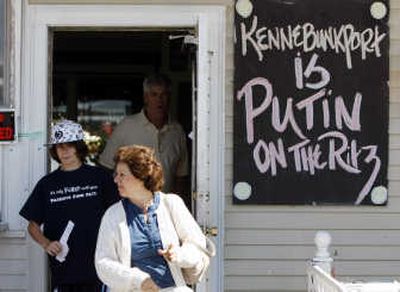Bush faces more assertive Putin in Maine

WASHINGTON – The first time Vladimir Putin met President Bush’s dog at the White House, the Russian president seemed distinctly unimpressed. When Putin later played host at his dacha outside Moscow, the Kremlin leader presented his Labrador to Bush.
“Bigger, tougher, stronger, faster, meaner,” Putin boasted, “than Barney.”
In many ways, Russia is a bigger, tougher, stronger nation than it was when Putin took office – and the relationship with the United States is certainly meaner. Putin, the first world leader to call Bush and offer help after the attacks of Sept. 11, 2001, has evolved from a potential partner to one of the most vexing players on the world stage for the American president.
As Putin arrives this afternoon in Kennebunkport, Maine, for an overnight stay at the Bush family compound, the president hopes to re-establish some of the rapport the two shared six years ago when they first met. But Putin these days is determined to play a more assertive role, one powered by Russia’s oil-driven economic resurrection and fueled by resentment of U.S. superiority and unwillingness to accept second-tier status.
Neither side expects any breakthroughs on the issues most dividing them, such as planned U.S. missile defense deployments in Eastern Europe or independence for the Serbian province of Kosovo. More important may be determining whether the two leaders can get relations back onto a more even keel, at least until their successors are chosen next year.
“Kennebunkport represents the last real opportunity for the two presidents to reverse the downward slide that’s characterized U.S.-Russian relations the last several years,” said Steven Pifer, a former Bush State Department official now at the Center for Strategic and International Studies. “But having said that, expectations should be modest.”
Some Russia scholars said the meeting may even be counterproductive, seemingly rewarding Putin with a rare invitation to Kennebunkport even though he recently compared Bush policies to those of the Third Reich and threatened to point missiles at Europe. “It sends all the wrong signals,” said Michael McFaul of Stanford University. “It says, ‘I can call you Hitler and you will invite me to your summer home.’ It says, ‘Russia is strong, and the Americans are weak.’ “
Both sides held meetings in the days leading up to Kennebunkport intended to send pointed messages to the other: Bush met at the White House with Toomas Ilves, president of Estonia, the former Soviet republic that has come under pressure from Moscow lately, while Putin at the Kremlin hosted Venezuelan President Hugo Chavez, perhaps Bush’s most virulent critic in Latin America.
How the U.S.-Russian relationship deteriorated to its lowest point since the Cold War has consumed specialists in both capitals. During their first meeting in Slovenia in June 2001, Bush famously said he looked into Putin’s eyes and got a sense of his soul. The terrorist attacks on New York and Washington three months later seemed to ratify that, as Putin overruled hard-liners and permitted U.S. troops to set up bases in Central Asia, a traditional Russian sphere.
But relations began to shift in 2003 with the launch of the Iraq war, which Putin opposed, and worsened months later with the Russian government’s politically charged arrest of oil tycoon Mikhail Khodorkovsky, a Putin rival, just weeks after he had been in Washington meeting with U.S. officials and opinion leaders.
A succession of subsequent events left Bush increasingly disturbed: Putin’s cancellation of gubernatorial elections after the Beslan school siege, his attempts to dominate neighboring Ukraine by influencing its elections and cutting off its natural gas, and, most recently, the polonium poisoning of former KGB officer Alexander Litvinenko in London.
“At the beginning … it looked like we were on track,” said John R. Bolton, who as undersecretary of state and ambassador to the United Nations dealt often with Russian officials. “Clearly something went wrong between 2003 and 2005.”
Many in Washington believe Bush misread Putin, captivated at their first meeting by the Russian leader’s story of his devotion to a cross his mother gave him. Bush saw a democrat instead of a former KGB colonel intent on reconsolidating power in the Kremlin. “There were a lot of signs that President Putin was not the reformer that President Bush was betting on,” said Sarah Mendelson, a Russia specialist at CSIS.
Others say Bush missed an opportunity to cement the early friendship by reciprocating after Putin accepted U.S. forces in Central Asia, NATO expansion into the Baltic states and U.S. abrogation of the Anti-Ballistic Missile treaty. In the Russian view, Washington never responded, not even lifting trade restrictions even though they no longer apply to China and other communist nations.